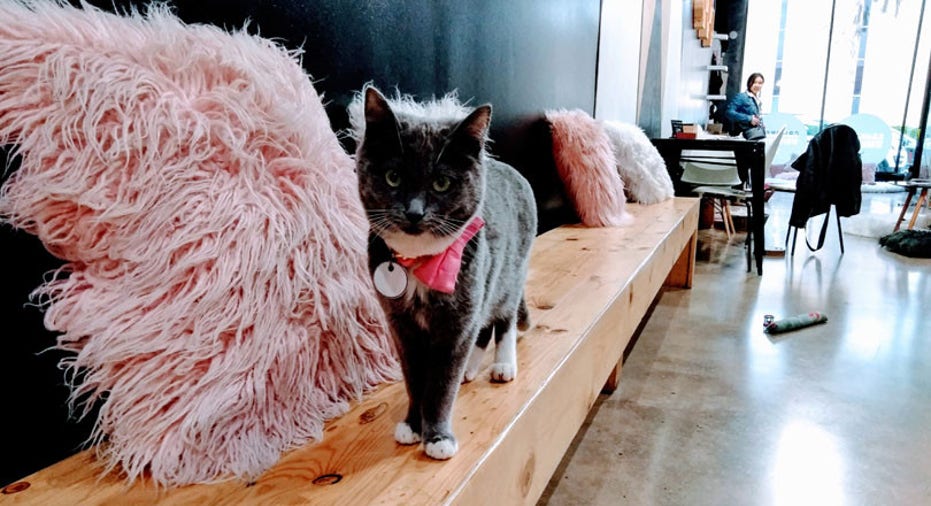The Future of Pets: Therapeutic Robot Cushions and Cat Cafes

As Los Angeles embraces mass transit and ride sharing, the concept of ownership is being challenged in other areas too, notably pets.
Like-minded, pet-owning Angelenos used to bond by hiking up Runyon Canyon or hanging out at the city's famous dog parks. However, pets require commitment, which can be hard for today's flex-life digital nomads who flit between Airbnb rentals, co-working spaces, and dating apps. Enter pet sharing.
If you're allergic to friends with fur, try Qoobo, the latest pet/cushion robot from Japan (of course). But for those who want to some real-life feline interaction, there's Crumbs & Whiskers. This cat cafe opened its second LA location in September 2016, on a stretch of Melrose Avenue between Paul Smith's famous pink wall (cue a million Instagram selfies) and Los Angeles Fairfax High School, a short walk from The Grove outdoor mall. It also has a D.C. outpost.
You have to book in advance for a 70-minute session, which costs $25. If that sounds steep, know that contributions go towards the Stray Cat Alliance, a local cat charity, and allows Crumbs & Whiskers to save homeless cats and house them in a nurturing environment.
The cats are rescued from local high kill shelters and are also available for adoption. Thus far, Crumbs & Whiskers has taken in $23,200 in donations and saved 1,420 kitties from euthanasia.
Due to municipal hygiene regulations, no food preparation is done at the cat cafe itself. You order before going in and a runner grabs drinks and snacks from a nearby partner business.
The day I dropped by, there were several 20-somethings taking a break after work, before going to a comedy club down the street. None of them could have pets at home, either due to rental restrictions or the nature of their travel-heavy work lives, so they used the cafe as a chill-out zone.
Founder and CEO Kanchan Singh started Crumbs & Whiskers after backpacking in Thailand while on a leave of absence from her disenchanting 9 to 5. On her 24th birthday, while celebrating with fellow friends at the cat cafe Catmosphere, she had a brainwave: take the cat cafe concept back to the US via a socially conscious business model. She raised over $35,000 on Kickstarter, and the first cafe opened in Washington D.C. three years ago.
But what if you're allergic? That's where Qoobo the robot pet (cushion) comes in.
I met up with Qoobo's creator—Shunsuke Aoki, CEO of Yukai Engineering Inc—when he was visiting the US recently. He told me how the idea came for a therapeutic robot cushion.
"Every year, at Yukai, we have a brainstorm and form into several groups to come up with new ideas. Qoobo came from Naoka Kataoka, one of our staff designers. She had grown up with many pets and, since moving to Tokyo, with its small apartments and rental restrictions, really missed having one around. So we worked on the concept of a cushion, with a tail, that would feel soft and comforting, and also respond to touch, just like a pet does."
Yukai (itself an homage to the Japanese word for "happy/ pleasant") had already made several robots before Qoobo, including Bocco, which encourages remote family members to participate in joint robot care, and Coconatch, another "kawaii" creation ("cute," if your Japanese is rusty) that lights up when social media messages appear.
Aoki wanted to prove there was a market for Qoobo first, so he too relied on Kickstarter, which had proven successful with Bocco. Astonishingly, they met their initial funding goal within six days and went on to raise more than $100,000, more than double its goal.
With 3,000 pre-orders at approximately $100 each, Yukai is now in production on Qoobo; the first units will ship in September.
"We decided on an initial production run of 3,000," said Aoki, "but then decided to increase the number in response to demand. We are still taking pre-orders but may have to stop taking them this summer if demand continues to grow."
Judging from the excitement in the LA cafe when we brought Qoobo out to play, let's hope production can keep up.
So what is it like? Initially I thought, "A cushion with a tail? How curious." Then I picked it up, stroked it cautiously, and it responded by wagging its tail. Of course my mirror neurons kicked in and I felt all warm and fuzzy instantly. Sometimes it's irritating being a human and so easily manipulated.
If you do decide a Qoobo is for you, perhaps ask Alexa ("Alexa, play 'cat sounds'") or Google Assistant to call up a purring audio loop for that added authenticity. I did, and it was spookily effective and remarkably soothing in stereo.
Aoki has long been interested in robots and started his first company in 2001, while still at Tokyo University studying Mathematical Engineering. It might look deceptively simple, but it took a fair amount of R&D before they got Qoobo to its current incarnation.
"We thought very carefully about its size and weight, and went through several prototypes," explained Aoki. "The final product comes in two shades, both washable, French Brown and Husky Gray, and we're also thinking of offering a template so people can make a few one in their favorite fabric. Its dimensions are [13 by 6 by 21 inches], and it weighs approximately [2.2 pounds]. It has a rechargeable, via USB, battery as well as an AC adapter, with a charge time of 8 hours."
Aoki is now looking to evolve the Qoobo platform, as well as explore the superiority, in his mind, of embodied creations, over Siri, Google Assistant, and Alexa. "Robots, by being embodied, can engage in non-verbal communication," he pointed out. "Basically, we just want to make robots that make people happy."
This article originally appeared on PCMag.com.



















